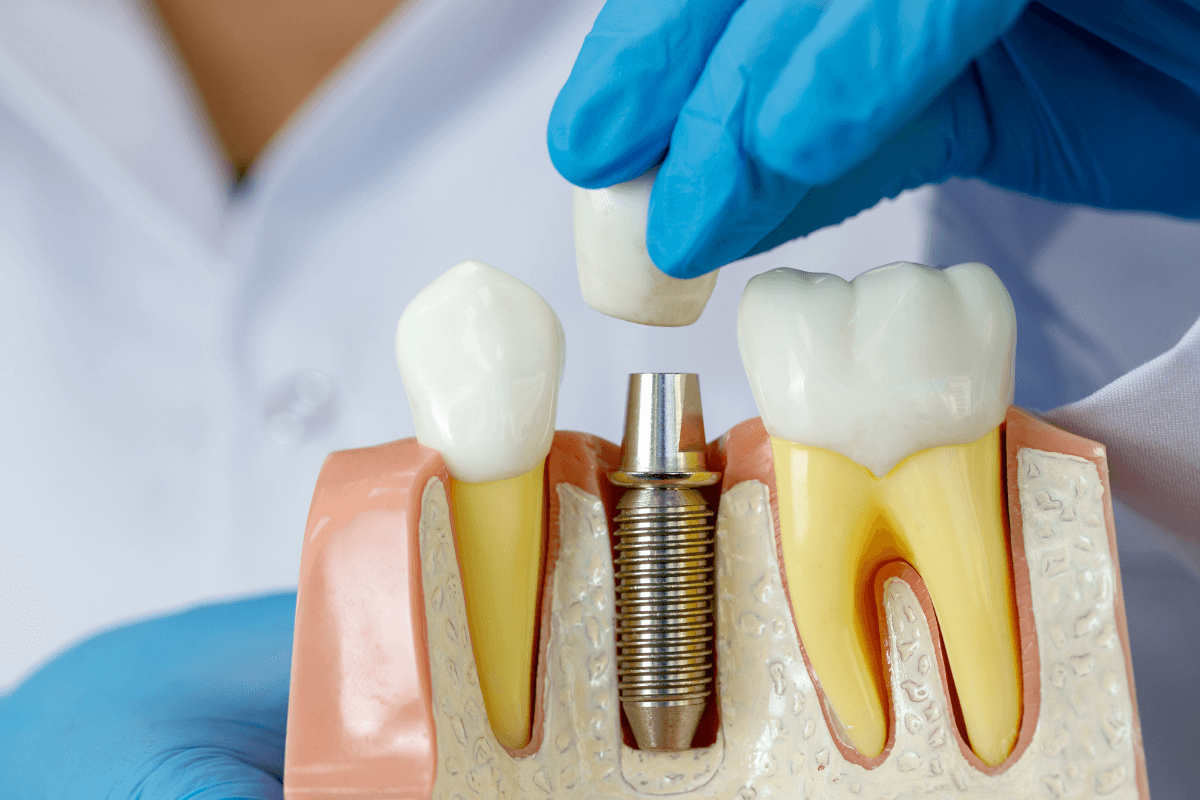
Have you ever come across someone who consumes an excessive quantity of sugar and visits the dentist seldom but never appears to develop cavities? This kind of person is uncommon, but it illustrates the idea that our mouths and bodies are all quite diverse and require different maintenance. In keeping with this, individuals who have missing, broken, or diseased teeth can be treated using a variety of dental implant types.
The good news is that you no longer have to choose between bridges and dentures if you have missing teeth. There are many different kinds of dental implants available today that can complete your smile. Dental implants are a fantastic choice and one you should discuss with your dependable dental expert, as they have a success rate of up to 98%. In order to give you the knowledge you need to identify the ideal dental implant for you, we are going to describe in this post, the many types of dental implants that are currently available.
But, before digging deeper into the types of dental implants, let’s take a quick look at what is a dental implant and how it works.
What are Dental Implants?
A metal screw is surgically affixed to the jawbone as a dental implant. It is a device made to firmly retain a prosthetic tooth in place. The replacement tooth fills in the space left by the lost one, reducing problems like crowding or shifting.
One of the earliest techniques for replacing missing teeth was the use of dentures. They can often be uncomfortable and make it difficult for the patients to chew their food or talk correctly. Additionally, they needed a lot of upkeep and were prone to damage. For other individuals, implants have completely replaced their dentures or at least made them less uncomfortable to wear.
Why Dental implants are better? - Benefits of Dental Implants
Modern Dental implants have the ability to support dentures and bridges, stop further tooth or bone loss, and prevent facial collapse. Additionally, they assist in replacing teeth that feel natural in the mouth and are cavity-resistant.
Other advantages of dental implants include:
- It can improve speech and pronunciation in particular
- It provides defence for your teeth and jawbones
- It is a robust and economical option
- It does not need any particular upkeep or cleaning
Who needs Dental Implants?
Anyone who has teeth is likely to lose them at some point. People obtain permanent teeth after losing their baby teeth. However, there are numerous situations in which they lose one or more teeth. Here are some of the causes of tooth loss.
Causes of Tooth loss
- Age: Elderly people have tooth loss owing to the aging process or dental problems.
- Dental Cavities: Dental cavities eat away at teeth from the inside, resulting in tooth loss.
- Gum illnesses: such as periodontitis, cause gum recession, swelling, and eventually tooth loss.
- Additional medical conditions: Tooth loss can be brought on by conditions like high blood pressure, diabetes, and arthritis.
- Trauma & Injury: Oral injuries, trauma, and accidents
- Tobacco Consumption: Smoking and using tobacco products are both known to lead to dental issues and eventually tooth loss.
- Osteoporosis: This causes loss of teeth and a decrease in bone density.
- Teeth extraction: Often, teeth become irreparably infected and must be removed. Teeth loss is a result of this.
- Cavities and Gum Infections: Dental cavities and gum infections are the most likely causes of tooth loss out of all of these factors. Dental implants, crowns, and dentures are required for people who have lost their teeth in order to replace them.
- Tooth Replacement: Replacement of missing teeth with implants is crucial because the gap left by missing teeth weakens neighboring teeth and promotes future tooth loss.
Also Read: 10 Tips to Fight Back Your Dental Anxiety
How many Types of Dental Implants are possible? - Types of Dental Implants
Two-Stage Dental Implants:
For this kind of implant, the dental implant must be surgically placed in the jaw bone. The dental implant will be exposed and the dental implant abutment and temporary crown or restoration will be attached after the mouth has had a few months to heal.
Endosteal/Endosseous Dental Implants:
Endosteal implants are often implanted in the jaw bone during the aforementioned two-stage therapy process. These particular dental implants are frequently utilized to replace bridges and dentures.
Single-Stage Dental Implants:
In order to expose the top of the implant with this type of dental implant, a lengthier implant is inserted into the jaw and gum. This enables your dental professional to install the abutment and restoration directly onto the implant after several months of healing without having to medically expose the dental implant once more.
Subperiosteal Implants
The metal frame of these implants is attached to the jawbone slightly below the gum line. The frame is fixed to the jawbone while the gums recover. Through the gums are posts that are connected to the frame. The posts are subsequently attached with fake teeth, the same as with endosteal implants.
All-on-4 Dental Implants
Adults who want to avoid dentures frequently have a good option in all-on-4 dental implants. The root of the missing tooth is replaced by a tiny titanium screw that is inserted into your jaw. This necessitates a minor operation. After it is completed, a crown is attached, creating a tooth that looks and functions very naturally. They are referred to as all-on-4 implants since each jaw uses 4 implants.
Implant Overdentures
Implant overdentures are a terrific alternative to conventional dentures, provided you are healthy enough to have your teeth extracted. When compared to conventional dentures, overdentures can add stability because they are affixed to implants. The advantages of overdentures frequently include enhanced speech, lessened discomfort, less need for denture adhesives, and the ability to reuse current dentures.
Bone augmentation
When your jawbone cannot support implants naturally, this entails restoring or regenerating it. According to research, the best outcomes are typically obtained when fortifying the bone with growth hormones and additives.
Sinus lift
In situations where the natural bone has deteriorated as a result of lost upper back teeth, this procedure, also known as sinus augmentation or sinus elevation, involves placing bone beneath the sinus.
Ridge Expansion
If the width of your jaw prevents it from supporting dental implants, a small ridge or gap can be made along the top of your jaw and filled with bone graft material.
What are the Dental Implant Risks? - Risks Associated with Dental Implants
Most implant surgeries go smoothly and successfully. However, implants can occasionally malfunction or heal improperly. For instance, smoking raises the possibility of failure. It is essential to practice good oral hygiene at home, including appropriate eating, brushing, and flossing, in order to lower this risk. Minor discomfort is typical following any dental surgery.
Conditions that need not be panic (Harmless conditions post Implant):
- Face and Gum swelling
- Bodily or Dental bruising
- A small amount of bleeding
- Discomfort at the implant site
More severe risks that may manifest after implant placement include:
- Damage to the blood vessels, gums, or teeth nearby
- Infection at the implant location
- Persistent bleeding
- Pressure and Sinus problems (if the implant is placed in your upper jaw)
- Bruised jaw and a fractured jaw
- Injury to the nerves that might cause tingling in the lips or mouth
Who is the Ideal Profile for Dental Implant? - The best fit to get dental implants
Artificial teeth are typically necessary for persons who have lost their teeth to regain both their appearance and functionality. But not everyone makes a good candidate for dental implants.
The majority of people are qualified candidates for dental implants, but this is only determined after prosthodontists and periodontists check the inner structures of the gums, jawbone, sinuses, and locations of the oral system's nerves.
Having said that, the following list of individuals is not a candidate for dental implants.
- Kids who are developing
- Chronically ill individuals, including those with untreated diabetes, immune system abnormalities, tissue diseases, and cancer patients
- Chain smokers
- Alcoholics
Do you think you need a Dental Implant? - Book an appointment now..!!
Modern Dental implants have the ability to support dentures and bridges, stop further tooth or bone loss, and prevent facial collapse. Additionally, they assist in replacing teeth that feel natural in the mouth and are cavity-resistant. If you think this is something you need and you are looking for then what are you waiting for? Connect with us now and book your appointment at the nearest local dental clinic
Go Back

















